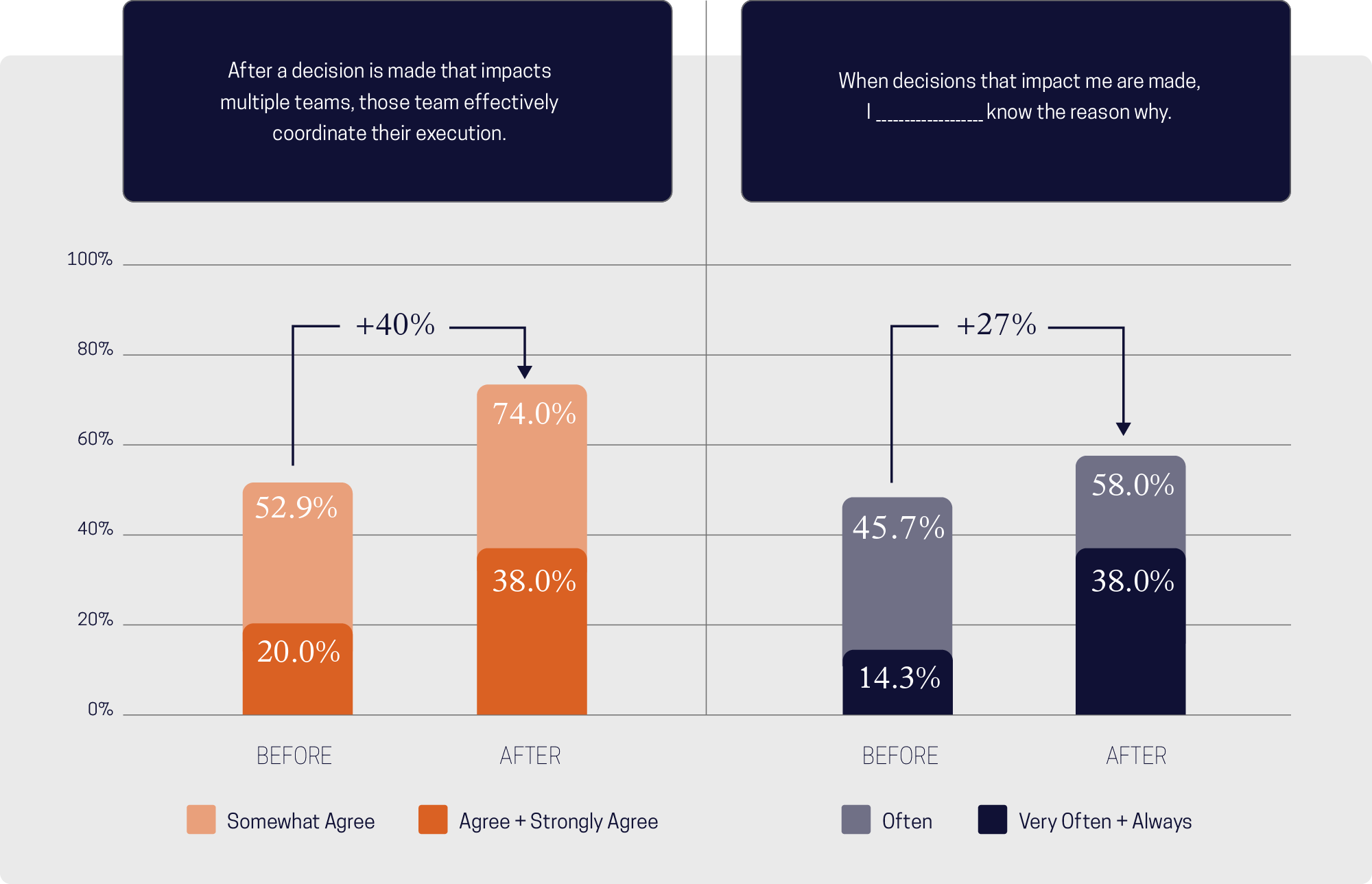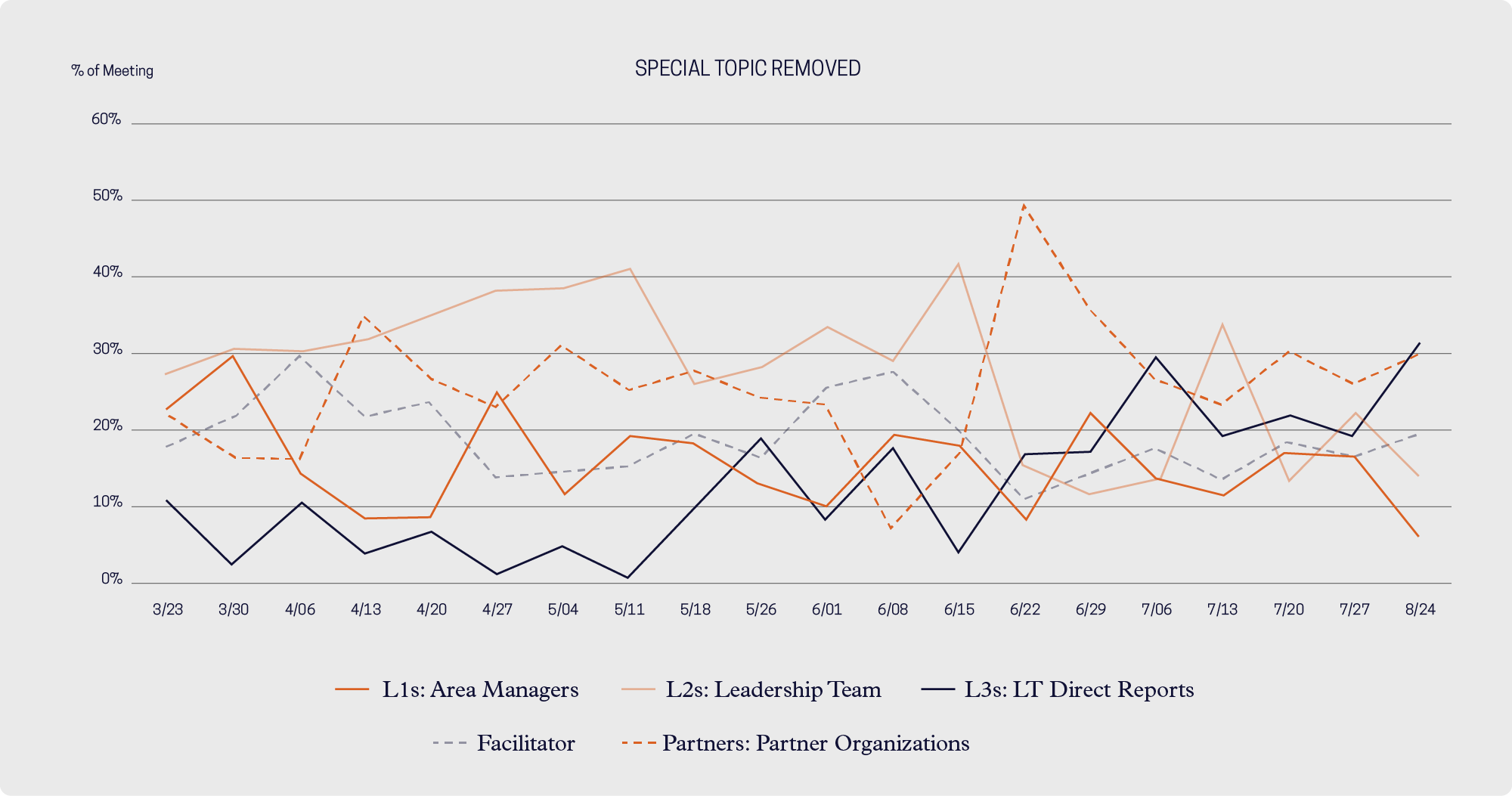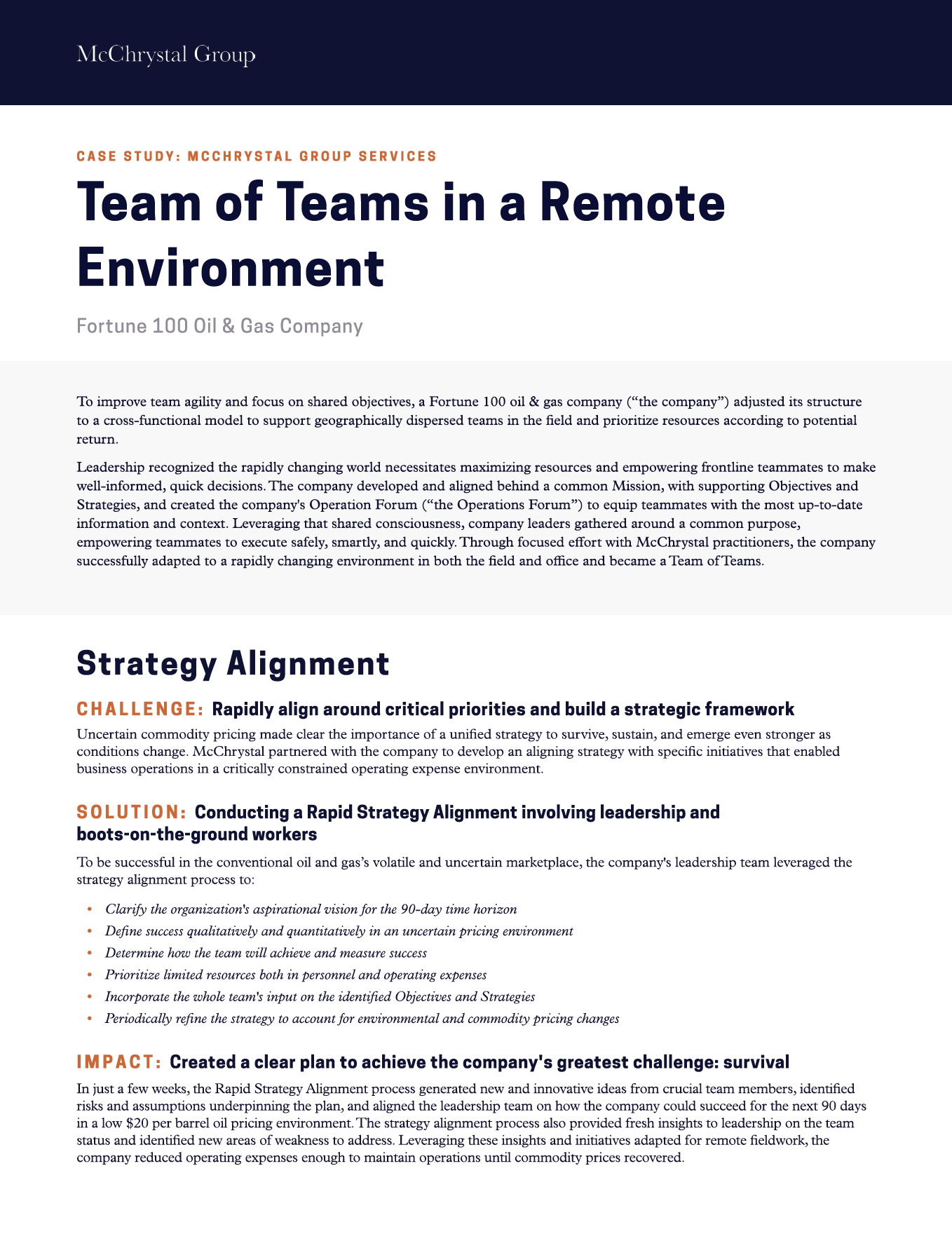Explore this energy company’s Team of Teams Transformation while transitioning to remote work, supporting their teammates in the field, surviving in a low-commodity price environment, and providing energy to the world.
To improve team agility and focus on shared objectives, a Fortune 100 oil & gas company (“the company”) adjusted its structure to a cross-functional model to support geographically dispersed teams in the field and prioritize resources according to potential return.
Leadership recognized the rapidly changing world necessitates maximizing resources and empowering frontline teammates to make well-informed, quick decisions. The company developed and aligned behind a common Mission, with supporting Objectives and Strategies, and created the company's Operations Forum (“the Operations Forum”) to equip teammates with the most up-to-date information and context. Leveraging that shared consciousness, company leaders gathered around a common purpose, empowering teammates to execute safely, smartly, and quickly. Through focused effort with McChrystal practitioners, the company successfully adapted to a rapidly changing environment in both the field and office and became a Team of Teams.
Strategy Alignment
CHALLENGE: Rapidly align around critical priorities and build a strategic framework
Uncertain commodity pricing made clear the importance of a unified strategy to survive, sustain, and emerge even stronger as conditions change. McChrystal partnered with the company to develop an aligning strategy with specific initiatives that enabled business operations in a critically constrained operating expense environment.
SOLUTION: Conducting a Rapid Strategy Alignment involving leadership and boots-on-the-ground workers
To be successful in the conventional oil and gas’s volatile and uncertain marketplace, the company's leadership team leveraged the strategy alignment process to:
- Clarify the organization's aspirational vision for the 90-day time horizon
- Define success qualitatively and quantitatively in an uncertain pricing environment
- Determine how the team will achieve and measure success
- Prioritize limited resources both in personnel and operating expenses
- Incorporate the whole team's input on the identified Objectives and Strategies
- Periodically refine the strategy to account for environmental and commodity pricing changes
IMPACT: Created a clear plan to achieve the company's greatest challenge: survival
In just a few weeks, the Rapid Strategy Alignment process generated new and innovative ideas from crucial team members, identified risks and assumptions underpinning the plan, and aligned the leadership team on how the company could succeed for the next 90 days in a low $20 per barrel oil pricing environment. The strategy alignment process also provided fresh insights to leadership on the team status and identified new areas of weakness to address. Leveraging these insights and initiatives adapted for remote fieldwork, the company reduced operating expenses enough to maintain operations until commodity prices recovered.
Communication and Empowerment
CHALLENGE: Driving cross functional communication and facilitating coordination
The company lacked a comprehensive knowledge-sharing platform, limiting access to timely and relevant information. This knowledge-sharing became increasingly important with uncertain commodity price environment, compounded with the complications of COVID-19.
SOLUTION: Designing a vertically and horizontally integrated cross-functional forum
McChrystal partnered with the company's strategy team to develop a forum that would facilitate critical operational knowledge sharing as the company adapted to a remote work environment. Because of the unprecedented commodity pricing environment, the McChrystal team worked nonstop with the company's strategy team to develop the Operations Forum with less than 72 hours to launch, all in the absence of the Area Manager who was serving as the company's Incident Commander for North America.
The Operations Forum includes company leadership, both technical and field experts, and Partners outside the organization that are critical to the success of the company's business goals. The Operations Forum remains the anchor for the company's operating rhythm.
IMPACT: Improved ability to adapt and execute confidently
McChrystal’s End of Engagement survey revealed a 1.6x increase in people who 'very often' understood why decisions affecting them were made. There was a 40% increase in the number of people who agreed “after a decision is made that impacts multiple teams, those teams effectively coordinate their execution.” Both data points directly result from increased transparency, more developed leader behaviors, and visible accountability in the weekly cross-functional Operations Forum.
In the near-term, the Operations Forum addressed challenges driven by the COVID-19 crisis:
- Rapid environmental changes
- Negative commodity prices
- Greater uncertainty within the employee base
- A sudden shift to remote work status
In the long term, the Operations Forum adapted to refocus the organization on business performance and updated priorities. Benefits included:
- Enables real-time insights from leaders and experienced subject matter experts and provides critical context which empowers the participants to make informed, day-to-day decisions.
- Builds a common operating picture and shared consciousness on a weekly basis for all participants involved.
- Creates a unified reality for all participants and a clear tactical direction in support of strategic objectives, linking experts from the field to leaders in the headquarters.
- Drives discussion with functional experts providing ground-truth, first-hand knowledge, and specialist depth around critical focus areas as appropriate.


Leadership and facilitators received focused leader behavior coaching based on McChrystal Group’s Meeting Analytics tool. On May 11th, the team recognized that leadership’s direct reports (L3s) were not contributing to the Observation Forum conversation. McChrystal worked with the Area Manager and facilitator to address this problem. Three months later, L3s were consistently accounting for ~25% of the Operations Forum’s speaking time.
Cascaded Decision Space
CHALLENGE: Establishing an environment of empowerment and effective prioritization
Ownership and accountability were unclear across the company's decision-making environment. Decisions were often revisited or ineffectively communicated, resulting in inefficient workstreams. Lack of timely decision-making inhibited the shift from “Fast Follower” to “Industry Leader.”
SOLUTION: Cascaded decision space down three levels of the organization
McChrystal partnered with the company's leadership team to develop a comprehensive decision-making framework. By defining the decision-making authority within the organization, the company's leadership were able to:
- Set clear expectations for decision-making at each level and by each leader
- Reduce ambiguity and remove barriers to progress
- Empower decision-makers closest to the problem to operate freely and efficiently
- Delegate to dispersed teams
IMPACT: Leaders were confident in empowering their aligned team with the most up-to-date information from the Operations Forum
By deliberately establishing decision-making authority throughout the organization, the company’s leadership could take an “eyes on, hands off” approach to decision-making and refocus on developing and executing the organization's strategy. The decisions that used to get stuck in leadership bottlenecks were pushed down to lower levels. There was a 26% increase in the number of people that agreed “decisions are made in time for effective execution.”
In the End of Engagement survey, employees rated the company markedly higher on incorporating the right stakeholders and considerations into the decision-making process and noted a perception of great improvement on speed and efficacy of their efforts.




